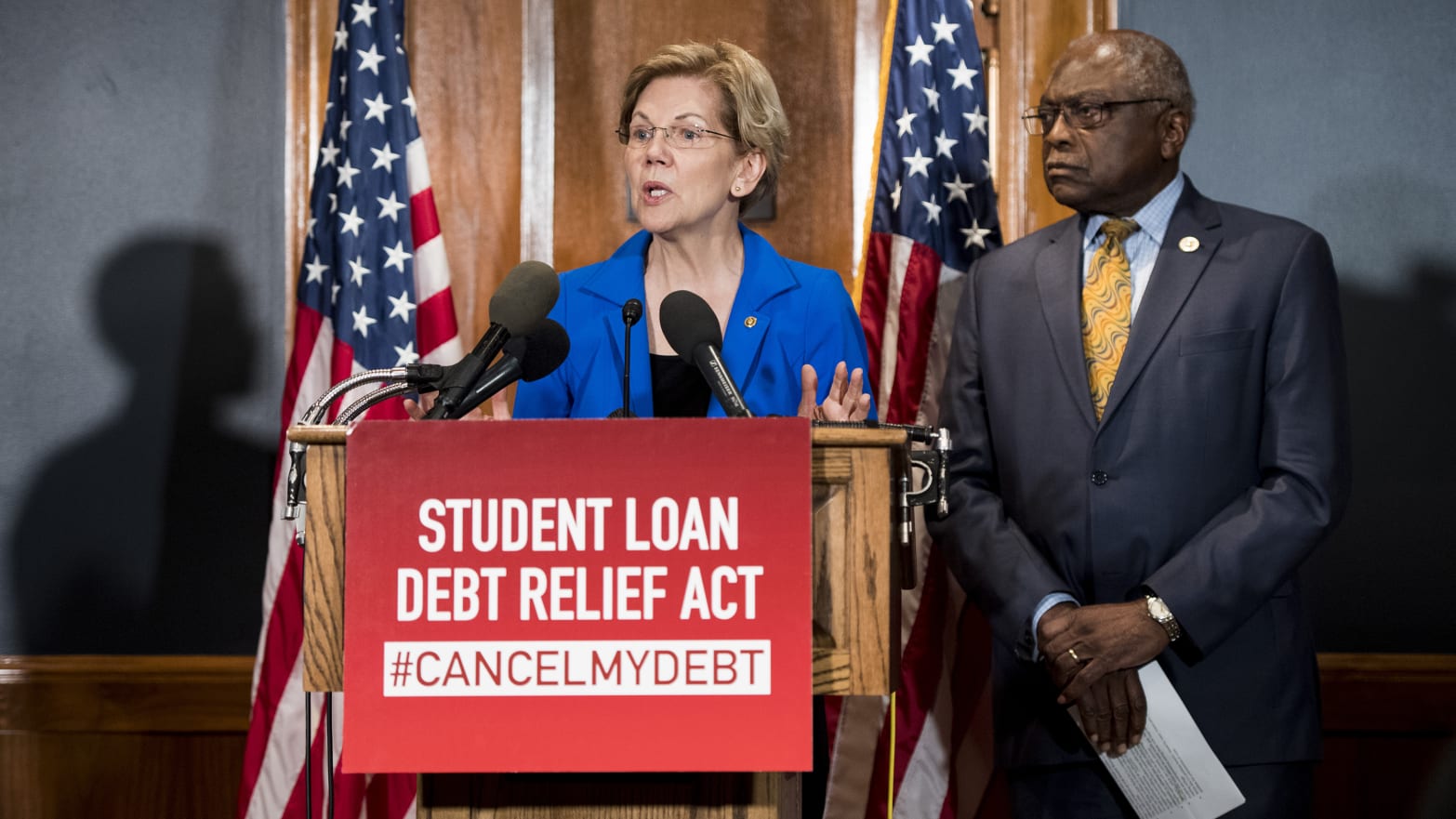An old adage attributed to Will Rogers says, “If you find yourself in a hole, stop digging.”
With Joe Biden’s approval ratings hitting a new low, Democrats seem hell-bent on ignoring this good advice. Take, for example, Monday’s The New York Times, in which Sen. Elizabeth Warren argues that the best way to avoid midterm losses is for Democrats to “deliver on more of our agenda...”
The idea of doubling down on a losing hand seems like dubious, if predictable, advice. Among Warren’s worst recommendations is “some student loan debt cancellation—an action the president could take entirely on his own.”
Now, Democrats differ as to how much would be forgiven, but some have called for wiping out all student loan debt. Others, like Senate Majority Leader Chuck Schumer, call for canceling as much as $50,000 per borrower. (During the 2020 race, Biden campaigned on canceling $10,000 of student loan debt per borrower.)
Let’s put aside whether the president actually has the unilateral power to cancel student debt (House Speaker Nancy Pelosi says he doesn’t)—it sounds increasingly like Biden is going to, once again, try to overstep his executive authority. On a recent episode of the Pod Save America podcast, White House Press Secretary Jen Psaki confirmed the idea was “still on the table,” noting that the current moratorium is “either going to be extended or we’re going to make a decision…about canceling student debt.”
I don’t expect that Democrats and the liberal commentariat want to hear this—but that’s a bad idea, both substantively and politically.
Let’s start with the substance. Academic research suggests that canceling student debt helps the rich more than the poor. Some people owe a lot of money—not because they are poor—but because they were wealthy enough to make bad bets. That is to say, they took out a loan to purchase what they believed would be a valuable investment that would pay dividends later (about half of all student debt is for graduate school).
As The Brookings Institution’s Adam Looney noted, “Medical school graduates typically owe six-figure student loans but that doesn’t mean they are poorer than high-school graduates who did not go to college.”
Should the person with the big medical school loan (for a degree that will make them millions over the course of his life) be forgiven, while the community college student who worked nights and weekends to pay for school gets nothing?
On top of that, canceling student debt would only perpetuate our current (corrupt or flabby—you choose) system. In the higher education bubble, the value of most college degrees has not kept pace with skyrocketing costs.
If higher education existed in an actual free market, this lag would force prices downward and/or incentivize lower-cost online learning, community colleges, commuter schools, vocational training, and apprenticeships.
Instead of allowing this bubble to burst, forgiving student loans would just further disconnect colleges from consequences, thereby curtailing whatever tenuous relationship exists in higher education between supply and demand—while guaranteeing that zero reforms get enacted.
Put simply: Nearly limitless government-backed student loans contributed to schools raising tuition costs exponentially, even as students racked up unsustainable debts, often for wildly overpriced degrees. To forgive student loan debt, while leaving this ridiculous system in place, is madness. We’ll be right back in this situation in about a decade, tops.
Those are the substantive reasons canceling student debt is a bad idea. The political reasons are much less disputable.
To be sure, people like getting free money, and there are around 43 million people who stand to be “winners” from this policy. At the same time, this policy does not provide any relief for those with a mortgage, car loan, or business loan. Nor will it help people who didn’t have the money to send their kids to college in the first place—or the people (like me) who took out a loan and already paid it off.
All of these people will feel that this policy is unfair and that they have been cheated. And they will, of course, be right. Because this policy advantages people who went to college, it is predictable that working-class Americans will see this as yet another example of a rigged system that advantages the children of elites.
What we are left with is a policy that spends loads of money, perpetuates a failing higher educational system, and likely pisses off more people than it pleases.
So why would Democrats do this? To progressives who are blinded by ideology, it makes perfect sense (both in terms of substance and politics).
For one thing, it rewards people like them. The higher your educational attainment, the more likely you are to have “consistently liberal political values.” As such, student debt forgiveness could be seen as a sop to a key Democratic constituency.
But it’s not just about rewarding fellow elites. Sen. Warren also contends that a higher percentage of “Black and Hispanic borrowers” take on student debt. Warren makes the questionable assertion that by doing this, “the president could make massive strides to close gender and racial wealth gaps.” But let’s assume she’s right. This could be viewed either as an altruistic attempt to level the playing field for historically disadvantaged people—or a redistributive sop to a key component of the Democratic coalition—or both.
Regardless, rather than serving as a lifeline for Democrats (as Warren suggests), the emphasis on student debt forgiveness could also be seen as a tacit admission of electoral desperation.
In other words, this feels like a sign Democrats have resigned themselves to losing the 2022 midterms, and are trying to rationalize (a) accomplishing whatever progressive “wish list” items they can before losing the majority; and (b) abandoning attempts to persuade swing voters, while pinning all their hopes on base turnout.
NBC News recently compared polling from 2018 (a great midterm year for Dems) with its own 2022 polling. What they found was that college-educated women are the only cohort that has become bluer.
In a scenario where Democrats have given up on persuasion and only hope to mitigate their midterm losses, it might make sense to focus on exciting and turning out the only demographic segment that has gotten more Democratic—college-educated women—regardless of the long-term consequences.
Once again, Democrats must decide whether to pander to their base or to pursue more moderate policies that might attract persuadable voters in the middle. This is a constant tension in politics. But when push comes to shove, Biden always seems to cave to the left. The results haven’t worked out great.
Joe Biden started digging this hole last year when he decided to ignore his mandate and tried to become the next LBJ. Instead, he’s heading toward the scrap heap of forgettable one-termers.
Biden’s numbers keep dropping. And he just. Won’t. Stop. Digging.
Progressive Rep. Pramila Jayapal tweeted over the weekend, "Student debt cancellation is racial justice. Student debt cancellation is gender justice. Student debt cancellation is economic justice.”
I don’t know about that, but I do know this: student debt cancellation is bad politics and a nonsensical solution to a serious problem. And even if Biden goes all the way with cancellation, I’m highly doubtful it’ll save Democrats at the ballot box this November.

